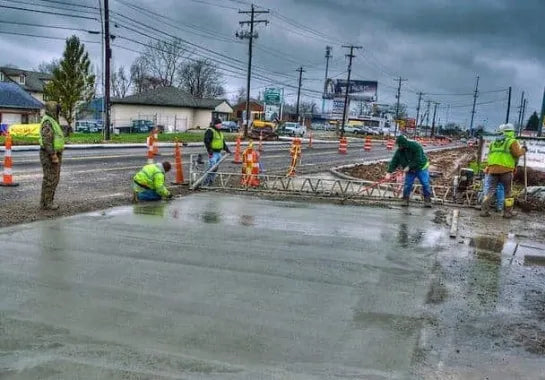Weather conditions can significantly impact construction projects, and rain is a particular concern when it comes to pouring concrete. In this blog post, we will explore the feasibility and implications of pouring concrete in the rain, as well as the precautions to consider for a successful outcome.
Rain's Impact on Fresh Concrete
Rainwater can dilute the concrete mixture and affect its strength and overall quality. Excess water can disrupt the curing process, potentially leading to long-term structural issues. Proper curing, which involves maintaining appropriate moisture levels and temperature, is crucial for the strength and durability of concrete.
Precautions for Pouring Concrete in the Rain
-
Plan Ahead: Keeping a close eye on the weather forecast allows for scheduling concrete pouring on dry days whenever possible. This proactive approach helps mitigate potential issues.
-
Protective Measures: If rain is expected during the pouring process, protective measures should be in place. Temporary shelters or tarps can be used to shield the work area from rainwater.
-
Proper Drainage: Ensuring adequate drainage systems on the site prevents water pooling or standing on the concrete surface, minimizing the risk of excess water absorption.
-
Professional Guidance: Consulting experienced contractors or engineers who can provide guidance specific to your project and prevailing weather conditions is essential. Their expertise will help determine the best course of action and any necessary adjustments.
Consider Postponing the Pour
In many cases, it is wise to postpone pouring concrete if rain is imminent. Waiting for dry weather conditions ensures a better-quality end result and reduces the risk of long-term complications. The inconvenience of rescheduling is often preferable to potential issues caused by pouring concrete in unfavorable weather.
Pouring concrete in the rain is generally not recommended due to the potential negative consequences. Rainwater can compromise the strength, durability, and quality of freshly poured concrete. Planning construction projects around dry weather conditions is advisable whenever feasible. However, if pouring concrete in the rain becomes unavoidable, taking precautionary measures, such as using protective covers and ensuring proper drainage, can help minimize the potential impact. Seeking professional advice and guidance is always advisable to ensure the best possible outcome for your concrete project.
Glossary
Curing: The process of maintaining the appropriate moisture level in concrete to ensure it hardens correctly and gains strength.Delamination: The separation of layers in the concrete, which can be caused by excess water from rain.
Hydration: The chemical reaction between water and cement that allows concrete to set and develop its properties.
Permeability: The ability of concrete to allow fluids to pass through, which can increase if rainwater mixes with the concrete mix.
Plasticity: The quality of fresh concrete that allows it to be molded or shaped; rain can affect this characteristic.
Set Time: The duration it takes for concrete to harden to a point where it can withstand certain pressures; rain can delay this process.
Slump: A measure of the consistency of concrete; too much water from rain can make the concrete too fluid.
Subgrade: The soil layer on which the concrete is poured; proper preparation can help manage rainwater effectively.
Tarpaulin: A protective covering used to shield fresh concrete from rain.
Water-Cement Ratio: The ratio of the amount of water to cement in a concrete mix, crucial for determining the strength and durability of the finished product.










